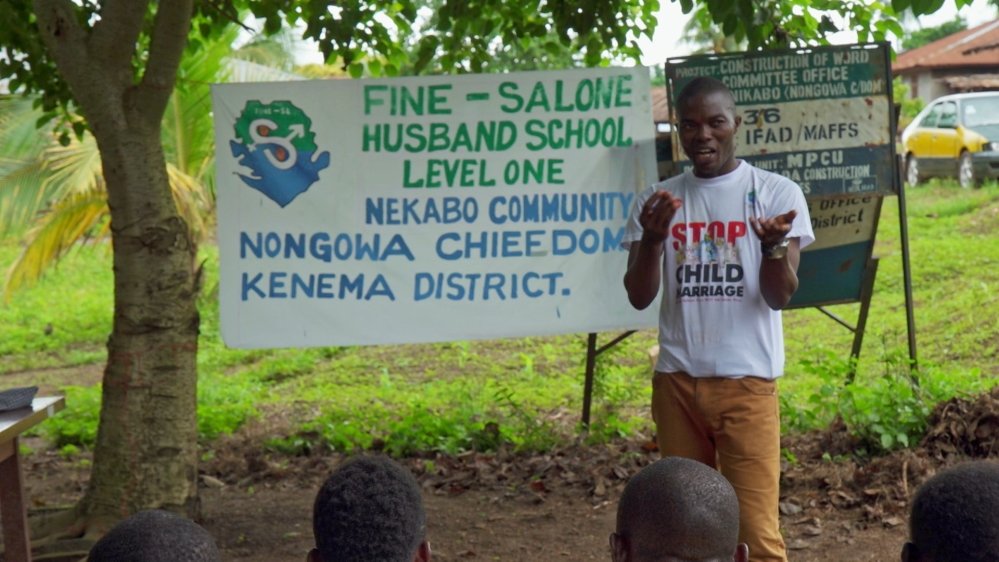Pidia Joseph Allieu has made it his life’s work to eradicate sexual violence in Sierra Leone.
Although the precise figures are impossible to confirm, it’s estimated that more than 200,000 women were the victims of gender-related violence during the country’s devastating 1991-2002 civil war – and this legacy of abuse has endured.
|
I am not doing my job for money. It’s a passion. Because I know it’s life-saving. |
As a teacher at the Husband School, Pidia attempts to make fundamental changes in the arena where some of the worst crimes are committed – marriage.
He leads classes for men in a rural area in eastern Sierra Leone, inviting them to share their views on the treatment of women and helping them to build a better understanding of the consequences of their attitudes and actions.
For many of these men – some past retirement age – this is the first time they have been in a formal classroom situation, but once a week for six months they take a break from their work and voluntarily participate in the training sessions. The idea is to open their minds to the bigger picture and encourage them to embark on a different, more mutually respectful relationship with their wives.
It is also not unusual for Pidia to be the first point of contact when a family reaches crisis point and acts of violence are committed.
“People trust me because my family have always lived in this neighbourhood; it’s why they call me first rather than the police,” he says.
But, as with many NGO projects in Sierra Leone, funding for the Husband School is inconsistent and Pidia goes months on end without payment. Nevertheless, Pidia is determined to continue his work, knowing that many families in the community rely on his support.
“I am not doing my job for money,” says Pidia. “It’s a passion. Because I know it’s life-saving.”
 |
| Pidia introduces villagers to the Husband School [Sam Liebmann/Al Jazeera] |
FILMMAKER’S VIEW
By Sam Liebmann
Men in the villages of Sierra Leone discussing gender issues seemed an intriguing prospect ever since I first covered the story a few years ago.
Watching the Husband School classes play out, I couldn’t help but admire the openness with which these grown men – some of them past retirement age – were willing to learn and discuss sensitive issues around sex, marriage, domestic violence, and other key moral and practical questions related to gender.
|
Ultimately, that men are discussing gender issues does not mean women are safe, nor equal. But I think the film does show that there is clearly engagement with the issues, and such engagement is vital for improving the lives of women around the world. |
Spending time with them, I realised how much I – and people in my own society – could learn from the spirit of openness that I saw during the classes; the willingness to discuss ideas in order to reach conclusions, as opposed to keeping quiet in case something politically incorrect is said.
I also realised that the men’s sometimes quite abhorrent views and behaviour were often not due to wilful ignorance. They’d lived through a war that basically shut the country down for decades, and many of the atrocities took place in rural areas like the one where Pidia grew up and where the Husband School classes are run.
Many families there live in relative poverty, even by Sierra Leone’s standards. Living far from the cities – the main political centres of power – leaves them isolated and effectively abandoned by the state. So the Husband School provides an opportunity for these men to learn about new ideas.
It is not that I think we should let men off the hook. Many women are experiencing some form of abuse by men who dominate society – and that’s why this “perpetrators” programme exists.
Like many other men and women in Sierra Leone’s civil society movement, Pidia is trying his hardest to make a positive change to their nation – working mostly for free and with little or no financial backing. Many of these inspiring people doing potentially life-saving work go unnoticed, yet they carry on despite many challenges.
Ultimately, that men are discussing gender issues does not mean women are safe or equal. But I think the film does show that there is clearly engagement with the issues, and such engagement is vital for improving the lives of women around the world.
 |
| Mariama discusses her relationship issues with Pidia [Sam Liebmann/Al Jazeera] |
Source: Al Jazeera




